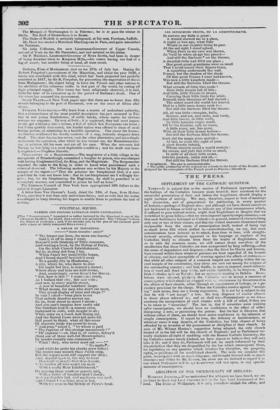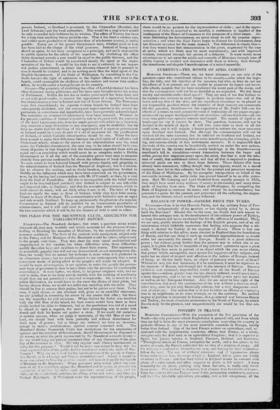ABOLITION OF THE VICEROYALTY OF IRELAND.
MORNING JOURNAL—If we understand the whispers we have heard, we are inclined to think that Loot An:ewe w;:1 be the last Lord Lieutenant of Ire- land. The Duke of Wellieglen, it is 'Aid, intends- to abolish the office, and govern Ireland, as Scotland is governed, by the Chancellor (Scotticn, the Lord Advocate) and the local authorities. This would he a step which would be only exceeded in its boldness by its wisdom. The office of Viceroy has been. for a long time anything but an enviable one. That it has been a useless one, and rather more productive of dissension than of wholesome control, is indis. potable. Every act of the parent' Government here, whether good or bad, has been laid to the charge of the chief governor. Instead of being consi-: dered an agent, he has been recognised as a principal, and made responsible to public opinion for the edicts of his superiors. By abolishing the office thirty thousand pounds a year would be saved to the.publie treasury, and the Chancellor of Ireland would be considered merely the agent or the repre- sentative of the law. It would be his duty to see it enforced, to see impar- tial justice administered, to direct the Attorney-General how to proceed in case it should be violated, and to be nothing more than the lesal agent of the English Government. If the Duke of Wellington, by conceding to the Ca- tholic lawyers the right of admission to the higher offices,. and even to the bench, could accomplish the abolition of this useless and worse than useless office, he would confer a lasting favour on his country.
Ocoee—The propriety of abolishing the office of Lord-Lieutenant has been often discussed among politicians, and has been once brought under the notice of Parliament. Within the last ten or twelve years much has been done, and as yet with good results, to remove the appearance of a separation between the administrative power in Ireland and that of Great Britain. The Treasuries were filet consolidated ; the separate revenue boards for Ireland have been subsequently abolished, and the consequent improvements in the several de- partments, in correctness and impartiality, have been generally acknowledged. The restraints on commercial intercourse have been removed. Whether in the present condition of Ireland it would be safe to dispense with the presence of the Lord Lientenant. \vim, from the ample powers with which he is invested, may exercise a large discretion on any emergency, may be doubtful; but we have no doubt that the abolition of the appearance of a separate government in Ireland would be a very fit part of a set of measures for the pacification of Ireland, of which Catholic emancipation should be one. When the laws have ceased to make that difference between the civil rights of Catholics and Protestants which, whatever the nature of the administration may be, must make the Catholics discontented, the next step to be taken should be to con- vince all parties in that kingdom that the Government regarded them with an equal eye—a conviction which would never be so complete under a Dublin Government as if all the acts of the executive power were seen to emanate directly front persons confessedly far above the influence of local dissensions.
No man seems to have behaved himself with greater dignity and propriety in the administration of Ireland than the Marquis of Anglesea; but it is misera- ble to observe the anxious, and no doubt baseless, speculations bruited in Dublin on the influence which may have been exercised on his government, slow, by his having had a conversation with Mr. O'Connell, or then, by a visit from the Earl of Enniskillen. All this is incompatible with the belief which ought to be inspired (and justified) that Ireland is subject to one inflexible awl impartial rule, as England ; and that the executive Government, which in truth cannot do much, will act fairly when it acts at all. The laws of Eng- land are nearly the same as those of Ireland, while they have little resem- blance to those of Scotland. The communication with Ireland is now as rapid and safe as with Scotland. To keep up permanently the phantom of a separate Government in Ireland will be justified by no irremoveable peculiarity of circumstances, and it will only tend to prevent that entire onion between the two countries which it will be for the interest of both to seek to effect.



















 Previous page
Previous page